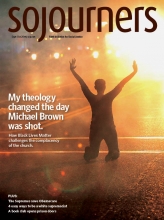The Seattle School’s Rachael Clinton, Assistant Director of Admissions, and Bethany Bylsma, Assistant to the Office of Students & Alumni and fourth-year MA in Counseling Psychology student, were recently featured in a Sojourners article, “Shelter in the Storm,” about the need for communities of faith to more effectively engage the realities of trauma and abuse.
In the article, which was written by Sandi Villarreal and appears in the September-October issue of Sojourners, Clinton describes a post-Enlightenment shift in emphasis from pastoral care to doctrine and knowledge—a shift that has left trauma survivors feeling isolated and vulnerable in the pews. The article goes on to list a variety of resources, including The Allender Center’s Lay Counseling Certificate, to help church communities engage the effects of trauma more holistically and effectively. “Understanding the nuances of trauma could help pastors lean into the responsibility of fully caring for those experiencing it within their communities,” writes Villarreal.
 “The church needs to face mental health as an issue that can be addressed and isn’t a matter of not praying enough about it,” says Bylsma in the article. “The reasons our minds work the way they do is because of the trauma they’ve experienced.” Villarreal highlights a recent Sojourners survey, in which two-thirds of pastors report speaking once per year—or less—about sexual or domestic violence.
“The church needs to face mental health as an issue that can be addressed and isn’t a matter of not praying enough about it,” says Bylsma in the article. “The reasons our minds work the way they do is because of the trauma they’ve experienced.” Villarreal highlights a recent Sojourners survey, in which two-thirds of pastors report speaking once per year—or less—about sexual or domestic violence.
“But advocates point to a steady stream of research that could begin to bridge the perception gap for some by concretely connecting body and mind and responses to trauma,” she writes. “Along with that essential role in the healing process comes the responsibility on the part of the pastor and faith community to address trauma and survivors of trauma with care and respect. Beyond providing references to advocates in times of crisis, faith leaders should be properly equipping themselves with the tools to address trauma theologically.”
In recent years, there has been a dramatic and ongoing shift in scientific and psychological understanding of the effects of trauma and the methods of treatment. At The Seattle School, we believe that this a space in which the integration of theology and psychology can have profound implications. When each person is cared for as a holistic being—body, mind, and soul—who is uniquely created in the image of God, the potential for healing is staggering.
We are proud to train therapists, artists, pastors, and leaders who are at the forefront of this work, which is integral to God’s ongoing work of healing and restoration, and we are thrilled to hear from others—like Sojourners—who are adding to the conversation.

